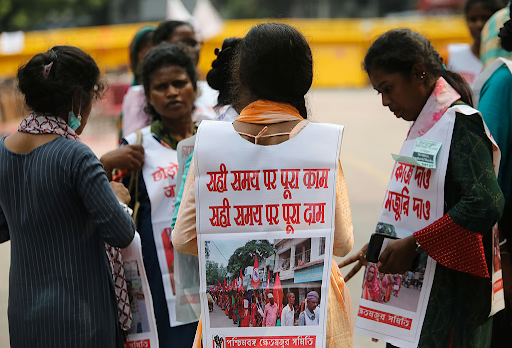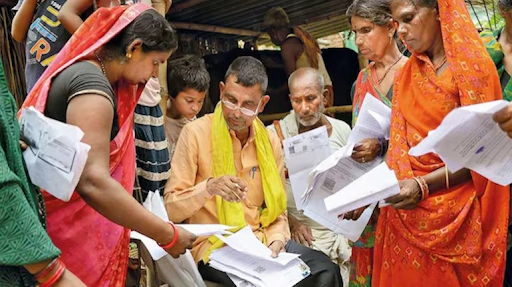



The Supreme Court’s order restoring MGNREGS funding to West Bengal reinforces the right to work and judicial oversight in welfare delivery. Arising from fiscal federalism tensions, it stresses the need for stronger social audits and cooperative Centre-State relations to safeguard rural livelihoods and accountability.

Copyright infringement not intended
Picture Courtesy: DOWNTOEARTH
The Supreme Court affirmed the Calcutta High Court's directive, ordering the Union government to reinstate work under the Mahatma Gandhi National Rural Employment Guarantee Scheme (MGNREGS) in West Bengal.
Enacted in 2005, MGNREGA is a social welfare program that guarantees the 'right to work' for rural households.
Objective: Enhance livelihood security in rural areas by providing at least 100 days of guaranteed wage employment in a financial year to every rural household whose adult members volunteer for unskilled manual work.
Key features include:
The Union Rural Development Ministry halted MGNREGS funds for West Bengal by invoking Section 27 of the Act, which allows the Centre to suspend funds and investigate irregularities in implementation.
Centre's Allegations
State's Counter-Arguments
Court Verdict
In June 2025, the Calcutta High Court ordered the Centre to restart MGNREGS work. In October 2025, the Supreme Court upheld this decision, rejecting the Union government's appeal.
Fund Release Delays
States experience delays in fund release from the Centre, leading to pending wage liabilities, even though the Centre asserts it clears pending liabilities.
Budgetary Concerns
The ₹86,000 crore budget for 2025-26, has been criticized as insufficient to meet the actual demand for the scheme.
Corruption and Leakages
Persistent concerns include allegations of misappropriation of funds, ghost beneficiaries, and inflated muster rolls, with the West Bengal case being a prominent example.
Administrative Bottlenecks
Insufficient staff, capacity deficits at the Gram Panchayat level, and technical glitches (e.g., Aadhaar linkage problems) impede smooth implementation.
A LibTech India report in 2024-25 showed 27.5% of all workers and 1.5% of active workers were ineligible for the Aadhaar Payment Bridge System (ABPS), leading to work denial.
Quality of Assets Created
Ensuring durable and productive asset creation remains a challenge, with concerns about temporary work and a lack of focus on long-term community benefits.
Low Wage Rates
A Parliamentary panel raised concerns over low MGNREGS wages, advocating for linkage to an inflation index for fair remuneration.
The average number of employment days often falls short of the mandated 100 days (e.g., 48.86 days in Tamil Nadu in 2024-25).
Lack of Effective Social Audits
Social audits, vital for transparency and accountability, often face implementation hurdles, including insufficient political will, resources, and community participation.
Strengthening Monitoring and Evaluation
Implement robust, real-time monitoring, using technology like geo-tagging, AI and drone surveys, to track work progress and fund utilization.
Empowering Social Audits
Strengthen social audit institutions through independence, resource allocation, and active participation of Gram Sabhas and civil society, as recommended by the Standing Committee on Rural Development and Panchayati Raj.
Enhancing Centre-State Cooperation
Promote cooperative federalism through dialogue and mutual trust between the Centre and states, replacing unilateral fund suspensions with collaborative problem-solving.
Streamlining Fund Release Mechanisms
Ensure timely and predictable fund release to states to prevent wage delays. The Ministry of Rural Development should closely monitor demand and seek additional funds from the Ministry of Finance when needed.
Addressing Technical Issues
Resolve problems with Aadhaar-based payment systems and other digital platforms to prevent genuine worker exclusion. Establish grievance redressal mechanisms for technical failures.
Capacity Building
Invest in training local administration and Gram Panchayat officials to enhance their ability to manage and implement the scheme efficiently and transparently.
Focus on Durable Asset Creation
Prioritize projects that create high-quality, durable assets benefiting the community and local economy, moving beyond mere wage generation.
Regular Wage Revision
Link MGNREGS wages to inflation index, such as the Consumer Price Index for Agricultural Labour (CPI-AL), and revise them annually to ensure fair and living wages.
The Supreme Court's order to resume MGNREGS in West Bengal highlights the priority of the constitutional right to livelihood, urging both Union and State governments to collaborate on reforming the scheme with transparency and accountability, ensuring employment and dignified livelihoods for vulnerable workers.
Source: DOWNTOEARTH
|
PRACTICE QUESTION Q. The right to work under MGNREGA is considered a fundamental social security entitlement. Discuss. 150 words |
MGNREGA is a law that guarantees at least 100 days of wage employment every year to rural households willing to do unskilled manual labor, aiming to enhance livelihood security.
Any adult member (18 years or older) of a rural household willing to do unskilled manual work can register for MGNREGA. Eligible persons must apply for a job card through their Gram Panchayat, which on verification issues a job card allowing them to apply for work. Work must be allotted within 15 days of submitting the application, failing which unemployment allowance is payable.
Work involves manual labor tasks like water conservation, land development, rural infrastructure building, and natural resource management. Wages are fixed as per statutory minimums, equal for men and women, and paid within 15 days of work completion.



© 2026 iasgyan. All right reserved